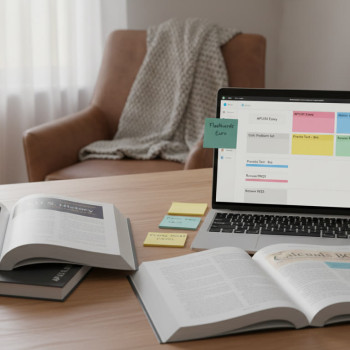Why this matters: The difference between AP credit and lab credit
You’ve worked hard in AP Chemistry or AP Biology. You crushed the labs, practiced titrations until your hands steadied, and maybe even wrote a research-style lab report that made your teacher proud. Then you get to college orientation and—surprise—the registrar tells you that while your AP score earned you credit or placement, it didn’t satisfy the school’s required lab course. Baffled and frustrated? You’re not alone.
This post is written for students and parents who want a clear, friendly roadmap: when AP exams replace college labs, when they don’t, and what to do about it. I’ll walk you through practical examples, the variety of institutional policies you’ll encounter, how to advocate for yourself, and study strategies (including how Sparkl’s personalized tutoring can help) so you can maximize your time and learning.
First: What do colleges mean by “lab credit”?
At its simplest, a lab credit typically means a college requires a hands-on, supervised laboratory experience as part of a science curriculum. That experience demonstrates skills like experimental design, data collection, analysis, safety procedures, and scientific communication. Many schools want those specific competencies on a college transcript because labs are where students practice the messy, real-world side of science.
AP exams, by contrast, are standardized assessments. They test knowledge and the ability to reason about experiments, and most AP science courses include a laboratory component at the high school level. But an AP exam and a college-run lab course are not always considered equivalent—sometimes because of curricular differences, sometimes because of accreditation or institutional philosophy.
Common reasons AP doesn’t replace a college lab
- Hands-on hours and formal documentation: Some colleges require a specific number of supervised lab hours taught by college faculty. They may not accept high school lab experiences in lieu of that requirement.
- Different learning objectives: College lab sequences often emphasize particular techniques, instruments, or research practices that the school considers foundational for subsequent courses.
- Accreditation and major requirements: STEM majors often have tightly prescribed sequences for accreditation (e.g., for engineering, biology, or chemistry programs). Those sequences may insist on college-level labs.
- Variability in high school programs: High school lab experiences vary widely in depth and rigor. Colleges sometimes make a blanket policy to ensure consistency across incoming students.
- Placement vs credit distinction: Some schools will offer advanced placement (placing you into a higher-level lecture) but won’t grant the lab credit—you still need to take the lab to fulfill a major or general education requirement.
Real-world scenarios—three typical outcomes
Here are scenarios you’ll often encounter at colleges. Knowing which category your chosen college uses will influence how you plan your senior year.
Scenario A: AP gives both credit and lab equivalency
At some colleges, a strong AP score (commonly a 4 or 5) grants both course credit and satisfies the lab requirement. That means you walk in with the lab credit recorded on your college transcript and can move on to higher-level coursework or explore new subjects.
Scenario B: AP provides placement but not lab credit
More commonly, colleges grant advanced placement for lecture material—so you can skip Intro Biology lecture and go straight to a second-year course—yet still require you to take the college lab. Policies like this aim to make sure all majors gain hands-on experience in the college’s labs.
Scenario C: AP gives neither credit nor lab equivalency
At selective programs or professional degree tracks, AP credit may be minimally recognized. You might receive recommended placement but be encouraged to retake equivalent courses at the college to better prepare for major-specific work.
How to find your college’s policy (and a simple plan to follow)
Don’t let uncertainty derail your planning. Follow these steps to get clarity as early as possible:
- Check the college’s AP credit policy page and the department pages for your intended major early—some departments have stricter requirements than general catalog rules.
- Contact the admissions or registrar’s office if policies are ambiguous. Ask specifically whether the AP score satisfies the college lab requirement for both general education and major tracks.
- Talk to the department undergraduate advisor for your intended major; they’ll tell you whether you’ll need the college lab even if you have AP credit.
- If still uncertain, ask about the possibility of petitioning for lab credit with a portfolio (lab notebooks, teacher recommendations, syllabi, and sample lab reports).
How to interpret college policies: a quick table
| Policy Language | What It Often Means | Action to Take |
|---|---|---|
| “AP score grants credit and lab equivalency” | AP result records as course credit and meets lab requirement | Confirm transcript posting date; plan to take advanced courses or electives |
| “AP grants placement only” | You can skip lecture but must take college lab | Schedule the lab in first-year fall/spring; use AP credit to take extra electives |
| “Departmental decision” | Individual departments decide lab acceptance | Contact the department advisor and request written confirmation |
| “Case-by-case or petition” | Possible to receive lab credit with documentation | Gather lab notebooks, syllabi, teacher letters; file a petition early |
What to do in high school to make your labs count
If you want the strongest chance of having your high school lab experience recognized, plan intentionally in junior and senior year. Here’s a checklist to follow:
- Keep detailed lab notebooks and dated data records for each experiment.
- File lab reports that mirror college-style write-ups: introduction, methods, results (with figures), discussion, and references.
- Ask your AP teacher for a syllabi copy, and request a letter describing the depth and hours of your lab experiences.
- Participate in advanced lab opportunities (independent research, science fairs, or summer research programs) that demonstrate sustained hands-on work.
- Document the number of supervised lab hours—many colleges respond well to concrete hour counts and descriptions of equipment used.
How to petition for lab credit (if your college allows it)
If the college offers a petition process, prepare a compact, evidence-backed portfolio:
- High school course syllabi with lab hour estimates.
- Representative lab reports and lab notebook excerpts (clearly dated).
- A letter from your AP teacher describing the lab curriculum, safety training, and your responsibilities.
- Any publications, awards, or research summaries that highlight your lab experience.
Submit the portfolio early and follow up with the department. Be polite but persistent—getting an answer before your first semester starts is ideal so you can plan your schedule.
Academic planning when AP doesn’t replace the lab
Okay, the AP score didn’t substitute for the lab. What now? Here are practical strategies to make the most of your first-year schedule.
- Take the college lab promptly: If it’s required, take it in your first year so you don’t delay major progress.
- Use AP credit to advance: If you have AP lecture credit, enroll in the next-level lecture course while taking the lab to keep momentum.
- Double up strategically: If your schedule allows, pair the lab with a complementary elective—this can broaden your skill set without wasting AP credit.
- Consider summer research or internships: Use freed-up elective spaces to pursue paid internships or lab assistant roles that add real experience to your résumé.
How Sparkl can fit into your plan
Sometimes the difference between a smooth transition and a scheduling scramble is having tailored guidance. Sparkl’s personalized tutoring can help students prepare lab portfolios, strengthen lab report writing, and strategize course sequences. With 1-on-1 guidance, tailored study plans, expert tutors, and AI-driven insights, Sparkl can help you present your high school lab experience more convincingly when petitioning for credit and guide you on which college courses maximize your goals.
Whether the immediate need is polishing lab reports, understanding statistical analysis for results, or planning which courses to take in the first year, targeted tutoring can save you time and stress.
Practical examples: Two student stories
Case 1: Maya—AP Biology score, still needed the lab
Maya earned a 5 on AP Biology and expected to skip freshman biology. Her university allowed her to place into second-year lecture but required the department lab for majors. Maya accepted the requirement and enrolled in the college lab during her first spring semester while taking a higher-level lecture in the fall. Because of that sequence she was ready to join a research lab in the spring of her sophomore year—and that research opportunity eventually led to an internship.
Case 2: Carlos—petition success
Carlos had a strong AP Chemistry background and extensive independent research data from a summer program. He compiled lab notebooks, a letter from his AP teacher, and a portfolio of experiments. The chemistry department accepted his petition and granted lab equivalency. He used the freed time to start physical chemistry his freshman fall—accelerating his major timeline.
Frequently asked questions
Will every AP score be treated the same by all colleges?
No. Policies vary widely. Some colleges accept AP exams broadly for lecture and lab substitution; others treat labs more conservatively. Always check each college’s policy individually.
Does a high AP score help my chances even if it doesn’t grant lab credit?
Yes. A high AP score still shows readiness for advanced coursework, which can help in placement decisions and when applying for research positions or honors programs.
Can I retake the college lab even if I have AP lab credit?
In many cases, yes—students who want a refreshed, hands-on experience at the college level can often enroll in the lab even if the credit isn’t required. This can be worthwhile if you want to practice instruments or techniques unique to the college.
Tips for parents: how to support your student
- Encourage documentation. Help your student keep lab notebooks, reports, and teacher letters organized.
- Advocate for early communication. Encourage them to contact college advisors before orientation so the schedule is predictable.
- Support strategic tutoring. If writing lab reports or statistical analysis is a weakness, consider targeted tutoring to build that skill set.
- Remember that flexibility matters—sometimes taking the college lab is the fastest path to research opportunities and internships.

Study and documentation practices that make lab petitions stronger
If you plan to petition for lab equivalency, quality and structure matter. Here’s how to build a strong portfolio:
- Label everything: Each notebook page should have a date, objective, hypothesis, materials, and step-by-step procedure.
- Include analyzed data: Raw numbers are good, but processed tables, graphs, and a brief statistical analysis make your work look college-level.
- Write clear conclusions: Demonstrate that you can interpret results and understand experimental limitations and sources of error.
- Get a teacher endorsement: A concise teacher letter that confirms lab hours and supervision is crucial.
When to embrace the college lab experience
Even if you’d hoped to skip it, a college lab can be an advantage. College labs often:
- Introduce research-grade equipment and safety protocols you didn’t use in high school.
- Offer direct contact with faculty and graduate students who mentor undergraduates in research.
- Provide structured opportunities—like lab assistant positions or honors projects—that can shape your career path.
See the glass half full: sometimes taking that college lab is the ticket into a research group or an internship that defines a major and a future career.
Checklist before you matriculate
- Confirm official AP credit posting dates and how they’ll appear on your transcript.
- Obtain teacher letters and syllabi before graduation.
- Contact department advisors to confirm lab requirements for your intended major.
- Prepare a portfolio if you plan to petition—organized, concise, and evidence-focused.
- Consider Sparkl tutoring for final polishing of lab reports, statistical reasoning, or petition letters—targeted coaching can make your materials more persuasive.

Final thoughts: plan deliberately, but stay flexible
AP courses are powerful investments: they build knowledge, demonstrate commitment, and can unlock credit or advanced placement. But they don’t always replace the college lab experience. The key is to research policies early, document your high school lab work meticulously, and be ready to take whichever route best supports your long-term goals.
If you want targeted help turning your lab experience into a compelling petition—or if you need a study plan to prepare for college-level labs—personalized 1-on-1 guidance can make a big difference. Tutors who understand both AP expectations and college lab requirements (as Sparkl’s mentors do) can help you write polished lab reports, design strong portfolios, and choose a course sequence that keeps your academic trajectory on track.
Start early, keep good records, and treat the lab—whether in high school or college—as an opportunity to learn a scientist’s craft. With careful planning and the right support, you’ll be ready not just to check a box, but to do meaningful work that opens doors.
Quick reference: What to do next (for students and parents)
- Look up 3–5 colleges you’re interested in and read their AP credit and department policies.
- Ask your AP teacher for a syllabus and a lab-hour estimate.
- Gather representative lab reports and notebook pages into a simple digital folder.
- If needed, draft a petition checklist and contact the department ahead of orientation.
- Consider a few Sparkl sessions to refine lab writing or to build a targeted first-year course plan.
Good luck—and remember: whether AP replaces the lab or not, your lab experiences and careful documentation add up to something meaningful on the path to college and beyond.


















No Comments
Leave a comment Cancel